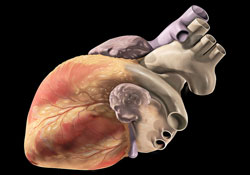Medical treatment and a healthy balance is crucial to combat the effects.

The human heart... Chronic stress leads to increased risk of heart attacks and strokes. (Image: Patrick J. Lynch, medical illustrator; C. Carl Jaffe, MD, cardiologist
heart, human heart, cardiac, human anatomy, coronary arteries, cardiology, aorta, pulmonary artery, vena cava, via Wikimedia commons)
As South African's feel increasing pressure to perform better and work harder under strained economic times and increases in daily living costs, has led to more people experiencing continuous or chronic periods of heightened stress levels. This condition has been found to trigger an overproduction of disease-fighting white blood cells, which can be harmful in excess.
This finding is based on a study conducted in the US, by Harvard Medical School, which revealed that when there is a surplus of white blood cells as a result of chronic stress, the surplus cells clump together on the inner walls of arteries, restricting blood flow and encouraging the formation of clots that block circulation or break off and travel to another part of the body.
A breakthrough
According to Graham Anderson, Principal Officer of Profmed, the medical scheme catering exclusively to graduate professionals, doctors have always associated stress with cardiovascular disease but this finding is a breakthrough. Compounding this condition are factors like high cholesterol and blood pressure, smoking and genetic traits that also contribute to heart attack and stroke risk.
"Studies have also shown that by ignoring symptoms of stress or experiencing prolonged periods of stress can compromise our immune systems, making us vulnerable to more chronic and acute conditions.
"These include peptic ulcers, headaches, sleep disorders, skin disorders as well as numerous other symptoms such as nausea, fainting, hand tremors, heart palpitations, tightness in the chest, lack of or increased appetite, chronic fatigue, muscular spasms and gastrointestinal problems," explains Anderson.
More OTC medication to counter stress
He says the impact of stress on people is resulting in more having to take over the counter pills such as painkillers or prescribed medication for depression and anxiety in order to cope with work stress and life pressures.
"Since stress also severely decreases the psychological resources and coping skills of an individual, you will be less able to manage your emotions, deal with pressure and are more likely to act out destructively.
"This could affect you negatively in your working environment where you may experience an increase in conflict amongst staff members or clients. It also negatively affects work-place performance and increases absenteeism," explains Anderson.
Some stress is good, but...
Furthermore, Anderson says a study, published in the Achieves of Internal Medicine, looked at data on 2,400 men and women in California, over a 20-year period. "About 25% of these people developed high blood pressure. For men it was found that unemployment, job insecurity and inadequacy in their job performance were all linked to at least a 50% greater risk of high blood pressure."
Once the physical wellbeing of an employee is compromised, it is easier and more likely for their emotional and psychological wellbeing to be compromised as well. "Causes of work-related stress include: heavy workloads; changes within the organisation; tight deadlines; changes to duties; job insecurity; lack of autonomy; boring work; over-supervision, inadequate working environment and a lack of proper resources," explains Anderson.
Though a fair amount of stress is healthy for people to cope with daily life, if it is escalating to levels where your physical and emotional health is being compromised It is crucial to seek medical advice from your General Practitioner or psychologist.




































